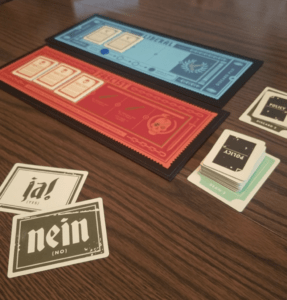Secret Hitler is a group social deduction game originally created by Goat, Wolf, & Cabbage LLC in 2016. I played the analog version over the board with my friends. The target audience of Secret Hitler is young adult and up (which I deduce from the less-than child friendly title). However, the game could easily be played by people of all ages. It’s a clandestine dance of suspicion, alliance, and deduction; those who dare to enter the world of Secret Hitler are catapulted into a torrent of psychological warfare and complex logical analysis.
I argue that “Secret Hitler” activates both fellowship and solution game fun types which allows each player to emphasize either or both of these play styles, effectively blurring the lines between the game environment and the outside world as boundaries close in, moving from favoring gut-feeling to deduction as the game progresses; the game mechanic induce a freedom in game-play to emerge which expertly blends a necessity for strategic communication and deception, and collective reasoning. This dynamic not only engages players in a deeply intense experience but also mirrors real-world interactions and the complexity of human relationships, politics, and acting under uncertainty, creating a compelling bridge between the mechanics of play, the mechanics of society, and the mechanics of a solution/puzzle game.
Unlike the social deduction games we surveyed in class (Werewolf) with relatively unstructured political mechanics, unstructured debate, and often baseless personal accusations, In Secret Hitler, you have a far more structured framework and game mechanics that actually makes “optimal” play feel like a possibility as the game progresses. Some of these intricate mechanics include, the Veto power in late-game which requires the President and Chancellor to agree to discard all policy tiles or the granting of special powers to the President after the enactment of Fascist policies introduces; both of these pose a significant strategic challenge to the liberals, and require complex deduction on their part to parse in the late game. Furthermore, there are known numbers of fascist and liberal policy tiles (although unfortunately I don’t know if those I was playing with were fully aware of what these exact numbers were). Knowledge of odds of the policy tiles means that over time you can rely on probability to make informed guesses about people’s true intentions. The mechanics force every player to constantly be making decisions based on this information close to every turn.

But even though the mechanics and setup allow for exciting deduction opportunities for more cerebral players, the game also necessitates strong socially dynamic play, which can be emphasized by players who prefer to exploit their knowledge of their friends or of human relationships more generally to gain an advantage. In many real-world scenarios, we rely on trust and cooperation under conditions of partial knowledge, and Secret Hitler is no exception. In Secret Hitler, knowledge generally increases as time goes on, so especially in the beginning of the game the social dynamics are very important, most of all for the fascists because it is in their best interest to win as quickly as possible since deduction can allow them to be discovered if they allow too much time to transpire. In class we talked about “boundaries,” and I think something that’s really special about this game is that the boundaries change throughout play. At the beginning of the game, the boundaries seem as wide as possible expanding past the game into the real world with requires mostly social deduction. However, as time goes on the boundaries close in on the fascists, and they become increasingly more desperate to clinch victory before the unrelenting mechanics and the deduction based on probability all but seal their defeat. That’s why I argue the great success of this game is forcing players to activate both types of fun and giving them the agency to rely on which one they enjoy most.
For a specific example, I enjoyed how the veto came into effect to force a more rigid deduction when the name is nearing an end as 5 fascist policies had been enacted. Because only fascists cards were handed to chancellor, and they agreed to the veto, it in a sense “vindicated” both of them and made the deduction to kill Hitler (me lol) very easy the next round. If I had to change anything, I don’t know if it makes sense for fascists to win via a Hitler election after 3 fascist policies. It does increase the pressure quite a bit and gets everyone super excited, but I do feel it causes a big chaos advantage for the fascists, and I’d propose nerfing this power by increasing the requirement to 4. That way, the social deduction requirement of the game is in play longer before deduction becomes the driving decision-making factor.


